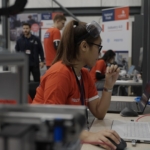It was great to hear the Prime Minister this week talking about the importance of high quality technical training and international trade as a means of boosting economic growth. The link between skills and trade is a key focus for us at WorldSkills UK and in her speech at Derby College this week, launching a review into the funding of post-18 education in England, the Prime Minister demonstrated that she grasps the key challenge, which has held back the advancement of apprenticeships and technical training for too long: lack of prestige. She said: ‘There remains a perception that going to university is really the only desirable route, while going into training is something for other people’s children’.
Parents naturally want what’s best for their children and we therefore shouldn’t be surprised if over two decades’ worth of education policies, pushing the university route as the marker for success, have left parents with the perception that their children need a degree to get on in life. However, the speech by the Prime Minister and recent public policy developments point to a changing landscape: the Skills Revolution and Careers and Social Mobility Strategies in England; the five-year action plan for apprenticeships in Wales; the Scottish Government’s target of 30,000 modern apprenticeship starts every year; and Northern Ireland’s FE Strategy.
All this demonstrates that there is recognition of the need for academic and technical routes to be seen as equally valid. This is a welcome and vital shift in public policies as we face up to and get a grip on how to fill growing technical skills gaps across the economy identified in the UK industrial strategy. Doing so should create opportunities for more young people to earn while they learn through high quality apprenticeships and technical training and for parents to see their children succeed in rewarding careers. This is what success looks like in terms of changing the ‘outdated attitudes’ the Prime Minister spoke about.
The trick to enhancing prestige further will be to create more high quality technical training aligned with business needs outlined in the UK industrial strategy, boosted by trade and inward investment partnerships. And the UK can’t afford to stand still. Technology is changing what we do at such a fast pace and, as the Prime Minister recognised in her speech, the worlds of AI, biotech and data science are real and evolving. If we don’t evolve with them, we will be left behind. Evolving means having an army of confident, highly-skilled young people who are ready to be able to take advantage of the new opportunities around them. It means not just more apprentices but a new understanding of what technical skills are, why they are important and how they can allow us to compete globally as a nation.
That’s why, in her Derby College speech, the Prime Minister also spoke of a self-confident, outward-looking nation that seizes opportunities to trade. This comes hot on the heels of her trade mission to China a few weeks ago. And as it happens, I was in China at the same time at the WorldSkills global leaders forum in Shanghai, helping prepare the ground for WorldSkills Shanghai 2021, when the Chinese will host the ‘skills olympics’. In the WorldSkills global benchmark, China is number one because at the most recent ‘skills olympics’ in Abu Dhabi, the Chinese walked away with 15 gold medals to top the medal table across a raft of advanced skills that power the country’s economy. I am incredibly proud of Team UK’s top 10 finish in the same competition, but the fact that China’s haul of golds exceeded our gold, silver and bronze medals combined, demonstrates both the skills gaps we face and the level to which we should be aspiring.
During my time in China, talking with my peers from across the world about the opportunities presented by Shanghai 2021, I was convinced that we need to work more closely with the Chinese to develop skills around areas of mutual economic interest in relation to trade and investment, such as financial services, digital manufacturing and green tech. And we also need to learn from them about how they produce their world-class skills. By grasping this opportunity, WordSkills Shanghai 2021 could not only be an important milestone in our international trade relationship, but our chance to demonstrate the high quality of British skills and the viability of investing across England, Scotland, Wales and Northern Ireland. By competing to the world’s highest standards in apprenticeships and technical skills in the world’s most technically skilled nation, Team UK can help bring new investment to our shores.
I’m convinced that the fact the competition is taking place in China means that all nations will raise their games to show what they can do. We need to step up too and start preparing for what we can achieve on this global stage and in doing so, support the Prime Minister’s ambitions to help challenge outdated assumptions about apprenticeships and technical training, boost our economic growth and help more and more young people get the best start in work and life.


